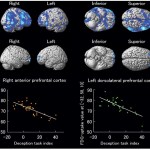Psychology
The Neurocritic points me to a paper, The brain structural disposition to social interaction:
Social reward dependence (RD) in humans is a stable pattern of attitudes and behaviour hypothesized to represent a favourable disposition towards social relationships and attachment as a personality dimension. It has been theorized that this long-term disposition to openness is linked to the capacity to process primary reward. Using brain structure measures from magnetic resonance imaging, and a measure of RD from Cloninger's temperament and character inventory, a self-reported questionnaire, in 41…
People By Nature Are Universally Optimistic, Study Shows:
Data from the Gallup World Poll drove the findings, with adults in more than 140 countries providing a representative sample of 95 percent of the world's population. The sample included more than 150,000 adults.
Eighty-nine percent of individuals worldwide expect the next five years to be as good or better than their current life, and 95 percent of individuals expected their life in five years to be as good or better than their life was five years ago.
...
At the country level, optimism is highest in Ireland, Brazil, Denmark, and New…
A few years ago I commented a fair amount on the topic of prosopagnosia, face blindness. Turns out that ~2% of the population can't really recognize faces, and this is a cryptic trait as many of these individuals have developed compensatory tendencies so that people don't know. Not only that, but there seems to be a strong genetic component so that it runs in families. At the time I was fascinated by this because it made me wonder at how much more "cryptic" variation there could be in the human population. It seems that face recognition is such a basic and universal "competency" that it is…
Most of us recognize the power of the urge to conform , but you don't often see it evoked and displayed so starkly as in this old Candid Camera segment. The CC crew seeds an elevator with several crew members who do odd things like face the rear of the elevator car. See how long the naive bystanders who join them hold out against the pressure.
-- Whu-oh: This is where missing video was --
update: Posted here was a wonderful segment as described above. I had found it via Google Video. It was up about 3 hours when I got an email from someone claiming to be from Candid Camera, Inc.,…
Music can be thought of as a form of emotional communication, with which the performer conveys an emotional state to the listener. This "language" is remarkably powerful - it can evoke strong emotions, and make your heart race or send tingles down your spine. And it is universal - the emotional content of a piece of music can be understood by anyone, regardless of cultural background.
Are the emotions evoked by piece of music similar to, and can they influence, other emotional experiences? The answer to these questions is unclear. But a new study, which has just been published in…
Money has subtler benefits beyond the ability to buy lavish goods or luxurious services - it's also a psychological and physical salve. According to research by Xinyue Zhou from Sun Yat-Sen University, handling money can soothe the sting of social rejection and appease the physical pain of hot water. Even bringing up the mere thought of money can have these effects.
Popularity matters to social animals like humans, who rely on each other for our wants and needs. Our dependence on each other makes it important to get along with our peers. But in many societies, money can bypass that need,…
Pt. I | Pt. 2 | Pt. 3
---
Part 3 with Martha McCaughey, discussing her book The Caveman Mystique, follows below. All entries in the author-meets-blogger series can be found here.
WF: So how is the use of evolutionary psychology to explain masculine actions not just quackery? Evolutionary biologists, and many who read science blogs, rightly announce and discredit the quackery of creationists or, more broadly, those who "deny" scientific truths. But, for the sake of argumentative symmetry, can one put that lens back onto evolutionary psychology? Besides the caveman issue, does that field…
Pt. I | Pt. 2 | Pt. 3
---
Part 2 with Martha McCaughey, discussing her book The Caveman Mystique, follows below. All entries in the author-meets-blogger series can be found here.
WF: How do you see the relationship between the academic fields of gender studies and science studies? And how has that relationship changed in the past two decades? I'm asking for a few reasons, but one of them is that I remember from graduate studies that many of the most persuasive accounts of the politics of science and technology came from feminist scholars.
MM: It's a big question, so I'll offer but a start…
I am pretty much on record that I would not pay for anything online (to be precise, to pay for content - I certainly use the Web for shopping). But with some caveats. I have been known to hit a PayPal button of people who provide content and information I find valuable. And I would presumably pay, though not being happy about it, if the information behind the pay wall is a) unique (i.e., not found anywhere else by any other means) and b) indispensable for my work (i.e., I would feel handicapped without it).
But I am not subscribed to, or paying for, anything right now and haven't been in…
I think it's a bit like terrorism. It scares the shit out of you but there's next to zero chance it will actually happen to you. Seriously... you have a much much higher chance of choking on a twinky (even if you've never eaten one) than catching the swine flu and dying or being or even seeing a terrorist attack. Talk about a great case of the Availability Heuristic...
Here's a demo for you to try out (I use this to teach Psych 100). The correct answers are below the fold.
Which is the more common cause of death in the USA?
1.
A) Asthma
B) Meningitis
2.
A) Breast Cancer
B) Stomach Cancer
3…
I first encountered Dan Ariely on the radio show Marketplace, where he offers up little nuggets of research data from the new field of behavioral economics. Because of the individual scale of the research many of Ariely's findings have some personal finance implications. Consider the pain of paying. This is the finding that when people pay with credit as opposed to cash for dinner, they are willing to spend more. Why? Because credit cards decouple the psychic "pain" of payment from the specific act. The act of deferring reduces our pain at the damage done, and allows consumption with less…
The episode is titled "your brains & your genes." There's more emphasis on economics than you think.
Bryan Caplan notes & argues:
If you take a closer look at BG research, though, you'll notice something interesting. Virtually every BG study partitions variance into three sources: genes, shared family environment, and non-shared environment. Typical estimates are something like 40-50% for genes, 0-10% for shared family environment, and 50% for non-shared environment.
And what exactly is non-shared environment? Everything other than genes and family environment!
...
Nevertheless, I strongly suspect that if non-shared environment's contribution to behavioral variance were a lot smaller…
In American high schools, black students typically perform worse than their white peers, which can damage their self-esteem and their future prospects. Studies have found that the fear of living up to this underachieving stereotype can cause so much stress that a child's performance suffers. Their teachers may even write them off as lost causes, and spend less time on them.
With so many students caught in this vicious cycle, where the stereotype of poor performance strengthens itself, it might seem absurd to suggest that you could turn things round in less than an hour. But try telling that…
Originally posted by Scicurious
On April 8, 2009, at 12:02 AM
As I'm sure everyone knows by now, Sci LOVES getting books in the mail. Even if I paid for them, I still love seeing them show up in a box. Even better is when I pick them out of a store and get to cuddle them on the way home. So you can imagine how happy Sci was to see this show up at the door:
I've always wanted a specialized psychiatric dictionary, almost as bad as I've wanted a specialized pharmacologic dictionary. It's a good thing to have handy, and is an even cooler thing to get in the mail. So Sci pranced around…
Jonah's interview of Judith Rich Harris is much recommended. Clearly related to my post on adoptive parents.
How accurately can medical professionals distinguish post-traumatic stress disorder from related conditions? Is it better to be safe than sorry, or is overdiagnosis hurting patients rather than helping them? These are some questions that ScienceBlogger and freelance journalist David Dobbs addressed in his article in the April edition of Scientific American, bringing light to data that suggests PTSD may be grossly overdiagnosed in soldiers returning from combat. The article's publication has prompted thoughtful discussion with counter examples that led Dobbs to the conclusion that PTSD is…
A study discussed over at Live Science confirms what I have always suspected:
An eight-year study of 218 couples found 90 percent experienced a decrease in marital satisfaction once the first child was born.
"Couples who do not have children also show diminished marital quality over time," says Scott Stanley, research professor of psychology at University of Denver. "However, having a baby accelerates the deterioration, especially seen during periods of adjustment right after the birth of a child."
An unrelated study in 2006 of 13,000 people found parents are more depressed than non-parents.…
Via Dienekes, Differential parental investment in families with both adopted and genetic children:
Stepchildren are abused, neglected and murdered at higher rates than those who live with two genetically related parents. Daly and Wilson used kin selection theory to explain this finding and labeled the phenomenon "discriminative parental solicitude." I examined discriminative parental solicitude in American households composed of both genetic and unrelated adopted children. In these families, kin selection predicts parents should favor their genetic children over adoptees. Rather than looking…
Neurological diseases can be strange in that they often have additional personality effects. If someone gets a cold, they sneeze a bunch but are basically the same person they were before the cold. In contrast, meningitis can include mental status and personality changes in its early stages -- including irritability and sleepiness. When a disease involves the brain, it can change who we are in addition to making us sick.
In this vein, I found this paper in the journal Brain particularly interesting. Abe et al. report that Parkinson's patients tell fewer lies than controls in a task where…

